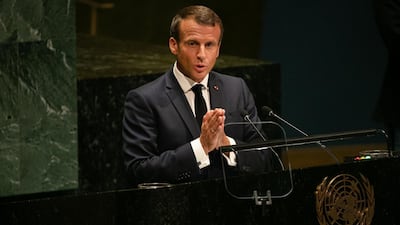For more than a month Emmanuel Macron has played peacemaker between Iran and the United States, trying to persuade them into negotiations.
On Wednesday the French leader seemed to be running out of time.
Having met presidents Donald Trump and Hassan Rouhani separately at the United Nations General Assembly, Mr Macron said there was a need for “responsible action” to reduce tension that flared this summer after tankers were attacked in the Arabian Gulf, a US drone was shot down and, on September 14, Saudi Aramco oil facilities were attacked.
But will he get anywhere?
The crisis could result in military conflict. A solution relies on flexibility from both sides.
Mr Macron, echoing a long-held European position, reiterated that he “never believed” that Mr Trump's “maximum pressure” campaign of economic sanctions on Iran was going to yield the results the US administration wanted after leaving the 2015 nuclear deal.
But seeking to stay in the middle of the dispute he also said Iran's ballistic missile programme, unchecked in the agreement, had to be tackled.
“I am not naive and I don't believe in miracles but rather in the courage to make peace, and I believe that the United States, Iran and all signatories of this accord have that courage,” Mr Macron said in his address to the General Assembly.
His proposal involves three major steps. Firstly, the existing nuclear deal must be broadened to include Iran's ballistic missiles. Secondly, there must be a regional security agreement in the Gulf. And thirdly there must be lifting of economic sanctions.
Iran has said sanctions relief is needed before talks involving the US can start. Mr Trump said on Tuesday there would be no such immediate step.
The Iranian demand, reiterated by Mr Rouhani on Wednesday, was described as unrealistic by German Chancellor Angela Merkel, who also met the Iranian president and Mr Trump.
And while attention has revolved around whether Mr Rouhani and US president would meet at the UN, other leaders revealed they had also become involved in mediation between the US and Iran.
Pakistan's Prime Minister Imran Khan told reporters that both Mr Trump and Saudi Crown Prince Mohammed bin Salman had asked him to talk with Iranian officials.
“Trump asked me that if we could de-escalate the situation and maybe come up with another deal,” Mr Khan said, though the US leader suggested it was the former cricketer who asked to mediate.
But the talk has become a runaround. So far no action has been forthcoming. And without reciprocal gestures Iran and the US will become further boxed in by their hard bargaining positions.



















